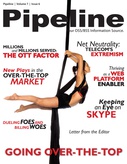|
|

network operators can’t offer exclusive,
premium services that look like the
Internet.
The Regulatory Challenge
Sometimes I feel bad for the folks at
the FCC. Basically, the FCC is made up
of a bunch of attorneys, some of whom
are killing time in a government gig for
one reason or another, who have to try
to figure out what engineers are
talking about every day and translate
that into practical recommendations
that Congress can adopt. This is no
simple task. When I read the public
comments the FCC solicits to help
frame new policy, they are often mind
boggling. The recommendations will get
into semantic discussions about
connectivity and capacity, trying to set
a basis for determining what is and
what is not the Internet based on how
and to where it is routed and which
technology it utilizes. Having worked
with the FCC for 15 years, originally as
a regulatory reporter, I can promise
you that very few, if any, of the
|
|
we’ll see some movement on making the over-the-top guys pay more |
|


overhead space on Southwest doesn’t
mean I think the FAA should force
Gulfstream out of business. If today’s
Internet is coach, well maybe it’s time
we got business class, first class, and
more.
What Will Happen?
If anything is going to force net neutrality rules to change, I suspect it will
be the wireless industry. I could base this argument on more techno-babble,
getting into the nature of wireless devices and backhaul networks and how you
have a clear delineation between the public Internet and wireless access
networks. But the bottom line is that the CTIA, the U.S. Wireless industry’s
lobby group, is extremely influential and has deep pockets. As the wireless
industry grows and becomes wealthier, its power to shift rules in its favor
becomes greater.
|
|
|
|
|

individuals who work there are ever
going to be able to translate that
mumbo-jumbo into something a U.S.
Senator is going to support.
When you combine the techno-babble
with the overly impassioned inputs
from conspiracy theorists who believe
any Internet regulation will turn the
entire world into a Stalinist dictatorship
and all people in corporate controlled
automatons, the result is an important
debate framed by extreme opinions
that mostly fail to address an important
question – where does the Internet go
from here? Does it continue to play to
the lowest common denominator, or
can we differentiate it in ways that
mirror many other aspects of society?
Just because some people are
fortunate enough to fly in custom
business jets while I’m fighting for
|
|

Don’t let the recent noise about Bill Shock, and the little wrist slap Verizon
Wireless received for its $1.99 data charges fool you – that’s all carefully
choreographed. Right now, wireless providers benefit from over-the-top apps
because those services, along with new smartphones, drive increasing data
subscription revenue. That revenue is recurring, visible, predictable, and
lucrative. When that market is fully penetrated, however, and the wireless
industry needs new avenues for revenue growth, then I suspect we’ll see some
movement on making the over-the-top guys pay more of the freight for the
services they now deliver to wireless devices, over wireless networks or the
Internet, at will.
|
|
|






